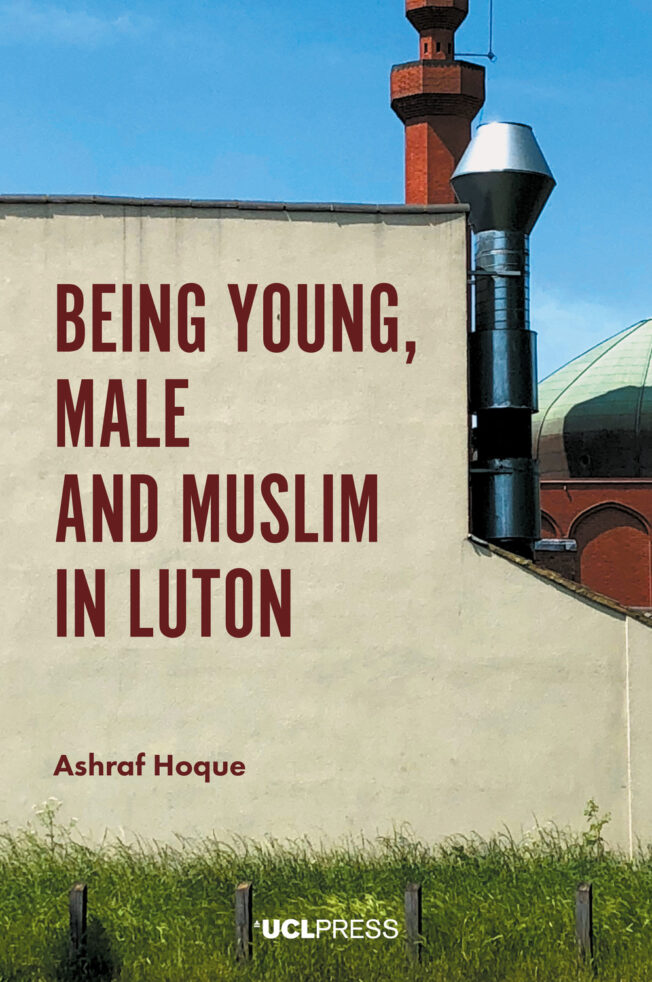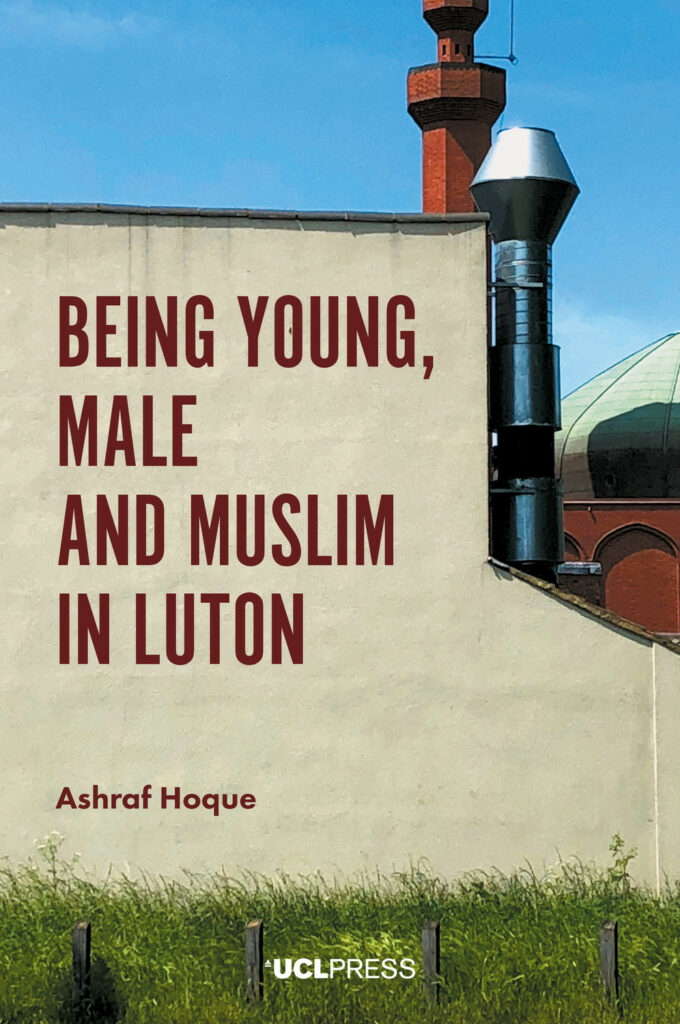
Being Young, Male and Muslim in Luton
Ashraf Hoque (Author)
Series: Spotlights
What is it like to be a young Muslim man in post-7/7 Britain, and what impact do wider political factors have on the multifaceted identities of young Muslim men? Drawn from the author’s ethnographic research of British-born Muslim men in the English town of Luton, Being Young, Male and Muslim in Luton explores the everyday lives of the young men and, in particular, how their identity as Muslims has shaped the way they interact with each other, the local community and the wider world.
Through a study of religious values, the pressures of masculinity, the complexities of family and social life, and attitudes towards work and leisure, Ashraf Hoque argues that young Muslims in Luton are subverting what it means to be ‘British’ through consciously prioritising and re-articulating self-confessed ‘Muslim identities’ in novel and dynamic ways that suit their experiences as a post-colonial diaspora. Employing extensive participant observation and rich interview content, Hoque paints a detailed picture of young Muslims living in a town consistently associated in the popular media with terrorist activity and as a hotbed for radicalisation. He challenges widely held assumptions about cultural segregation, gender relations and personal liberty in Muslim communities, and gives voice to an emerging generation of Muslims who view Britain as their home and are very much invested in the long-term future of the country and their permanent place within it.
This short and accessible book will be of interest to students seeking grounding in Islam and Muslim communities in diaspora, and scholars from an array of social science and humanities backgrounds including Anthropology, Sociology of Religion, Political Science, Urban Studies and Cultural Studies.
Praise for Being Young, Male and Muslim in Luton
‘These are fundamentally stories of young men in modern urban environments. The book’s most valuable work is to shed light on this reality. Hoque shows us a world of people who have been parodied in the press but are for the most part ordinary citizens trying to understand how they fit into modern life.’
Literary Review
‘Barely 100 pages, yet it packs a powerful punch, skilfully combining facts, theory, and description to provide insight into the reasons why third-generation young Muslim men combine their Islamic faith with everyday provincial ‘Britishness’. …As an ethnography [it] is well written, commendably well referenced, and nicely contextualized in the relevant literature… as an imaginative and insightful monograph on young Muslims in Britain, the book deserves to be taught widely in introductory courses in anthropology.’
Journal of the Royal Anthropological Institute
‘this book has lots of interesting insights to offer’
European Journal of Communication
‘In this timely and original book, Ashraf Hoque takes us beneath the headlines to hear from voices often spoken ‘of’ rather than ‘to’. Rich in both ethnographic data and theoretically informed analysis, Being Young, Male and Muslim in Luton marks a very welcome contribution.’
Professor Nasar Meer FAcSS, University of Edinburgh
Introduction
Discussion
1. Luton
2. Family
3. Friends
4. Religion
Conclusion
DOI: 10.14324/111.9781787351349
Number of pages: 128
Publication date: 25 February 2019
PDF ISBN: 9781787351349
EPUB ISBN: 9781787351370
Hardback ISBN: 9781787351363
Paperback ISBN: 9781787351356
Ashraf Hoque (Author)
Ashraf Hoque is a social anthropologist based at the Department of Anthropology, UCL. His work focuses on anthropological approaches to migration and diaspora, the anthropology of Islam and political anthropology. To date, Ashraf has conducted ethnographic fieldwork in the UK and Bangladesh.
‘Being Young, Male and Muslim in Luton is barely 100 pages, yet it packs a powerful punch, skilfully combining facts, theory, and description to provide insight into the reasons why third-generation young Muslim men combine their Islamic faith with everyday provincial ‘Britishness’. …As an ethnography [it] is well written, commendably well referenced, and nicely contextualized in the relevant literature… as an imaginative and insightful monograph on young Muslims in Britain, the book deserves to be taught widely in introductory courses in anthropology.’
Journal of the Royal Anthropological Institute (JRAI)
‘These are fundamentally stories of young men in modern urban environments. The book’s most valuable work is to shed light on this reality. Hoque shows us a world of people who have been parodied in the press but are for the most part ordinary citizens trying to understand how they fit into modern life.’
Literary Review
‘this book has lots of interesting insights to offer’
European Journal of Communication
‘In this timely and original book, Ashraf Hoque takes us beneath the headlines to hear from voices often spoken ‘of’ rather than ‘to’. Rich in both ethnographic data and theoretically informed analysis, Being Young, Male and Muslim in Luton marks a very welcome contribution.’ – Professor Nasar Meer FAcSS, University of Edinburgh
Related titles
Being Young, Male and Muslim in Luton
What is it like to be a young Muslim man in post-7/7 Britain, and what impact do wider political factors have on the multifaceted identities of young Muslim men? Drawn from the author’s ethnographic research of British-born Muslim men in the English town of Luton, Being Young, Male and Muslim in Luton explores the everyday lives of the young men and, in particular, how their identity as Muslims has shaped the way they interact with each other, the local community and the wider world.
Through a study of religious values, the pressures of masculinity, the complexities of family and social life, and attitudes towards work and leisure, Ashraf Hoque argues that young Muslims in Luton are subverting what it means to be ‘British’ through consciously prioritising and re-articulating self-confessed ‘Muslim identities’ in novel and dynamic ways that suit their experiences as a post-colonial diaspora. Employing extensive participant observation and rich interview content, Hoque paints a detailed picture of young Muslims living in a town consistently associated in the popular media with terrorist activity and as a hotbed for radicalisation. He challenges widely held assumptions about cultural segregation, gender relations and personal liberty in Muslim communities, and gives voice to an emerging generation of Muslims who view Britain as their home and are very much invested in the long-term future of the country and their permanent place within it.
This short and accessible book will be of interest to students seeking grounding in Islam and Muslim communities in diaspora, and scholars from an array of social science and humanities backgrounds including Anthropology, Sociology of Religion, Political Science, Urban Studies and Cultural Studies.
Praise for Being Young, Male and Muslim in Luton
‘These are fundamentally stories of young men in modern urban environments. The book’s most valuable work is to shed light on this reality. Hoque shows us a world of people who have been parodied in the press but are for the most part ordinary citizens trying to understand how they fit into modern life.’
Literary Review
‘Barely 100 pages, yet it packs a powerful punch, skilfully combining facts, theory, and description to provide insight into the reasons why third-generation young Muslim men combine their Islamic faith with everyday provincial ‘Britishness’. …As an ethnography [it] is well written, commendably well referenced, and nicely contextualized in the relevant literature… as an imaginative and insightful monograph on young Muslims in Britain, the book deserves to be taught widely in introductory courses in anthropology.’
Journal of the Royal Anthropological Institute
‘this book has lots of interesting insights to offer’
European Journal of Communication
‘In this timely and original book, Ashraf Hoque takes us beneath the headlines to hear from voices often spoken ‘of’ rather than ‘to’. Rich in both ethnographic data and theoretically informed analysis, Being Young, Male and Muslim in Luton marks a very welcome contribution.’
Professor Nasar Meer FAcSS, University of Edinburgh
‘Being Young, Male and Muslim in Luton is barely 100 pages, yet it packs a powerful punch, skilfully combining facts, theory, and description to provide insight into the reasons why third-generation young Muslim men combine their Islamic faith with everyday provincial ‘Britishness’. …As an ethnography [it] is well written, commendably well referenced, and nicely contextualized in the relevant literature… as an imaginative and insightful monograph on young Muslims in Britain, the book deserves to be taught widely in introductory courses in anthropology.’
Journal of the Royal Anthropological Institute (JRAI)
‘These are fundamentally stories of young men in modern urban environments. The book’s most valuable work is to shed light on this reality. Hoque shows us a world of people who have been parodied in the press but are for the most part ordinary citizens trying to understand how they fit into modern life.’
Literary Review
‘this book has lots of interesting insights to offer’
European Journal of Communication
‘In this timely and original book, Ashraf Hoque takes us beneath the headlines to hear from voices often spoken ‘of’ rather than ‘to’. Rich in both ethnographic data and theoretically informed analysis, Being Young, Male and Muslim in Luton marks a very welcome contribution.’ – Professor Nasar Meer FAcSS, University of Edinburgh

